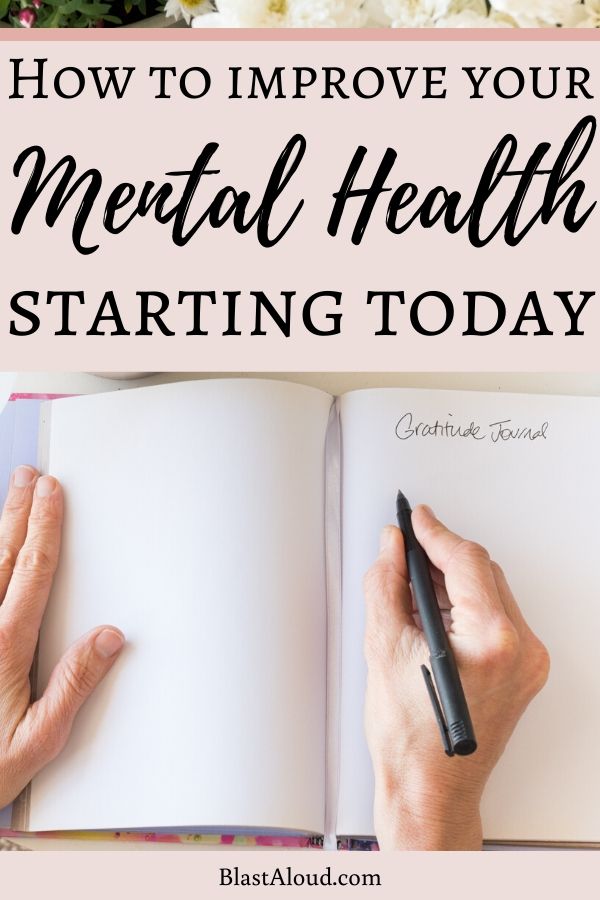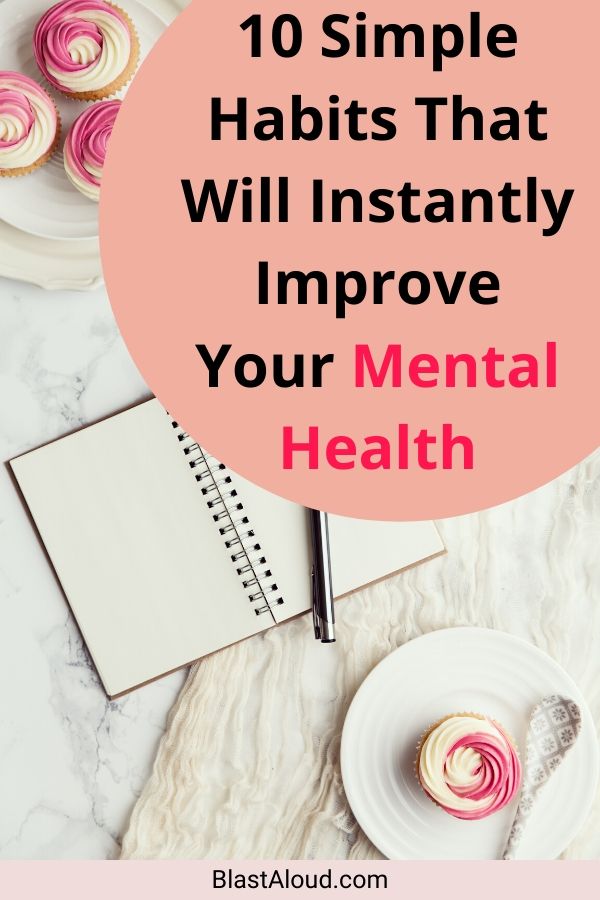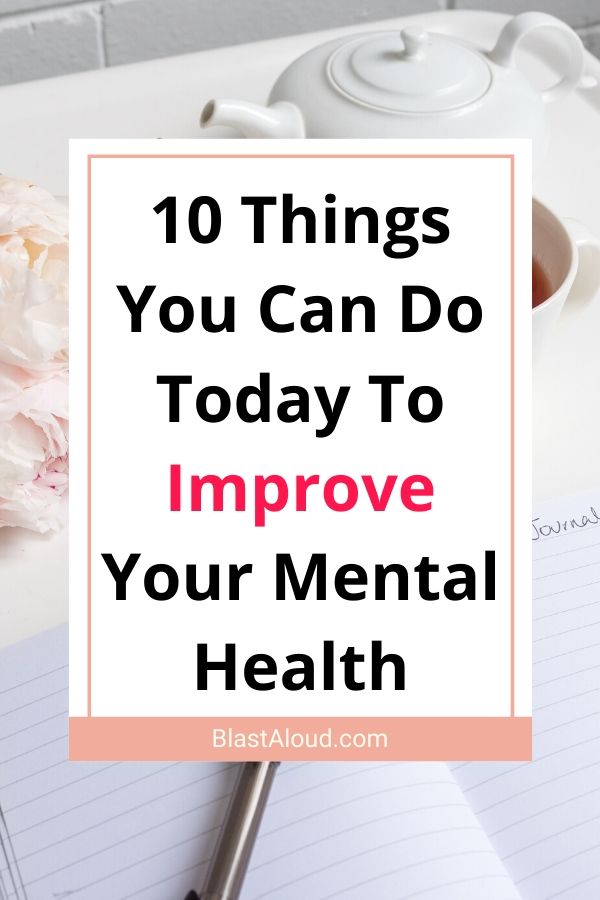With everything going on in the world, and how busy our lives can be, it is imperative that you constantly look for ways to improve your mental health.
Often when people hear about mental health, their first thought is depression, bipolar disorder, schizophrenia, and other examples of mental illness. But in reality, mental health goes beyond just diagnosable mental illness.
According to the World Health Organization, “Mental health is a state of well-being in which every individual realizes his or her potential, can cope with the normal stresses of life, can work productively and fruitfully, and can contribute to her or his community.”
Improving your mental health is as essential as every other part of your well-being. People tend to treat physical illnesses like cancer, diabetes, etc. but ignore their mental health.
With the constant struggles of life and the crazy things going on in the world today, there is a high tendency that all this would take a toll on your mental health. Therefore, one of the best self-care practices you can do for yourself is to improve your mental health.
Improve your mental health
Mental health is a person’s emotional, psychological, and social well-being. Your mental health plays a significant role in how you think, feel, deal with situations, and take action.
It would be hard to live a healthy and fulfilling life if you don’t. Being mentally healthy is a crucial part of living a happy and well-rounded life. By making your mental health a priority, you will be able to live a better life.
Do everything you can to make your emotional, psychological, and social well-being a priority today,. Your mind and body will thank you for it.
Not having good mental health can lead to anxiety, depression, post-traumatic disorder personality disorder, eating disorder, substance abuse, and psychotic disorder.
Below are ten effective and practical ways to improve your mental health!
1. Make and maintain healthy relationships
Loneliness is a factor that can contribute to mental health issues such as depression. When you stay by yourself idly for too long, you may begin to entertain depressing thoughts and even form bad habits such as smoking. You must develop healthy interpersonal relationships with your family and friends.
When you are struggling, and you need someone to help you, don’t be ashamed to ask your family or friends. Asking doesn’t mean you are weak, and it is better than suffering in silence. Be open and honest with your family and loved ones.
Join a community of people that share your interests either online or offline and try to maintain a healthy relationship with people around you.
Create a sound support system of people that understand your struggle and help you feel less alone in it. You should also maintain healthy boundaries in your interpersonal relationships so that people will not take advantage of the relationship they have with you either consciously or subconsciously.
2. Constantly practice gratitude
It is okay to want to have more wealth and material things, but the fact that you wish for more should not make you lose sight of what you have already. Instead of complaining about what you don’t have, you should be grateful for what you already possess and then work towards getting better. Quit complaining.
You only get depressed, stressed, or anxious when you let negative thoughts cloud your mind. And thinking about all that you don’t have instead of focusing on what you already have will only leave you stressed and depressed.
One very effective way to practice gratitude is by keeping a journal and writing down all that you are grateful for daily. Spend at least five minutes writing down at least three things that you are thankful for, either big or small. Things such as the air you are breathing, the fact that you can use the parts of your body, etc.
The more you dwell on positivity, the more your mind adapts to it, and in the end, you will notice that you can think better and do better things for yourself.
3. Forgive and Don’t hold grudges
One way to improve your mental health is by forgiving someone who has wronged you and not holding grudges. You must learn to forgive and forget. You also need to forgive yourself for any mistake you may have made in the past and regret.
Don’t dwell on your past mistakes, instead learn from it, let go of it and live better in the now.
The truth is that no one is above making mistakes. Studies have shown that people who forgive have better mental health and are more satisfied with their lives. When you don’t hold grudges, your mind is free from any form of bitter or negative thoughts.
4. Maintain a healthy diet and sleeping routine
You need to maintain a healthy diet and sleeping routine if you really want to improve your mental health. Eating a healthy and balanced meal is an essential part of your general well-being. Anything you take into your body affects your mood and overall health.
Eat lots of fruits and vegetables, drink enough water, avoid taking too much sugar and junk food.
Make sleep a priority. Try to incorporate going to bed at the same time every day. Create and follow your routine so that you can get quality sleep because it is crucial. Getting quality sleep isn’t only about the number of hours you spend sleeping; it is also about getting a restful sleep that will keep you energized for the day ahead.
If you are struggling with sleep, you can try out some practices like meditation to help clear your head and calm your mind. Keep your bedroom dark and quiet and resist doing anything except sleeping in your bedroom. But if any of these don’t work, you may need to seek out professional help.
5. Be optimistic every day and do the things you love
It is easy to think about the things that are not going well in your life, then declare that your life is doomed and quickly fall into depression and anxiety. You need to make a conscious effort to be optimistic and always look on the bright side of things.
Consistently practice having an optimistic and positive attitude towards life and moving from negative thoughts to positive ones.
Do the things you love, take up a new creative hobby that will help you feel fulfilled, explore new areas, smile often, laugh, go out and breathe in some fresh air, and just have fun.
Read self-development books, take yourself out on a sweet treat, listen to your favorite music playlist, do the things you love, and that make you happy.
Set goals for yourself and work towards achieving them. Pursue your dreams and make them come true. Go out of your comfort zone and try something new and exciting. Just live.

6. Relax and take a break when you need one
It is okay to relax and take a break when you need one; overworking yourself will only leave you stressed out, and stress isn’t good for you. Therefore you need to reassess your priorities and cut back on some work if possible.
Too much stress or poorly managed stress over a long period can have a detrimental effect on your social, emotional, and physical well-being.
7. Don’t compare yourself to others, stay away from negativity, and learn to say no
Comparing yourself to other people either via social media or in real life does more harm to your mental health than good. It is the actual devil. Remember that everyone is on their own journey. Regardless of whether you are the same age or if you do the same job, everyone has a different route.
Give yourself credit for going through life in your way, you’re doing the best you can.
Learn the difference between being inspired by someone else’s success and comparing yourself to them. The other person may have already gotten to the middle when you were just starting, so quit comparing yourself.
Stay away from harmful content and negative people because they will hurt you in the end.
You must also learn to say no when necessary. Learning to say no is power because it is impossible to say yes to everything and everyone. You will only be shooting yourself in the foot if you do. You will begin to feel overwhelmed and inadequate.
Learn to say no and don’t feel bad about it. Stop trying to please everyone because it is not possible. Quit being a perfectionist and feeling like you are not good enough. Love your flaws because they make you unique!
Don’t let other people’s opinions about you dictate your feelings. Always have a positive body image because it will help to improve your self-esteem. Wear clothes that make you feel good.
Also read my post on how to stop worrying what others think of you if you often let others’ opinions hold you back.
8. Quit unhealthy habits such as taking alcohol and smoking
If you want to improve your mental health and live a healthy life, you need to quit certain unhealthy habits. Alcohol has a significant effect on your overall well-being and health. It changes your brain chemistry and increases stress and anxiety.
Cutting down on or quitting smoking and drinking alcohol will serve you well.
9. Exercise regularly
The positive impact of physical exercise on your mental health cannot be overemphasized. It plays an essential role in helping you to battle with anxiety, depression, stress, and any related condition.
Exercising can improve your sleep, make you feel more relaxed, and increase your body’s production of endorphins, which can improve your mood. There are different ways you can exercise; it doesn’t have to be a high-intensity routine. It could be as simple as taking a walk or dancing!
Just look for the form of exercise that you genuinely enjoy so you’ll stick with it. You can also check out my post on ways to be more active without going to the gym for some tips.
10. Get help if you need to
Some symptoms that you may experience if you have a mental health condition include: Eating too much or too late, sleeping too much or too little, lack of energy, constant mood swings, constantly fighting with your loved ones, feeling confused, forgetful, angry, or on edge.
You need to take mindful note of your mind and body so that you can identify these symptoms, because you may be anxious, depressed, or stressed without even realizing it.
To figure things out, you can ask yourself questions like:
- Am I as interested in everything I used to be interested in?
- Do I feel more irritated, angry, or on edge than usual?
- Am I drinking alcohol more than I used to?
- Has the quality or quantity of my sleep diminished?
- Has my appetite or weight changed?
- Do I have less energy than I used to?
- Have my loved ones commented on any changes in my mood or behavior?
This is not to strictly ascertain that you have a mental health condition if you experience any of these symptoms, but if they persist, then you should seek professional help.
Final thoughts
On a final note, when trying to implement the tips mentioned above, you need to be patient with yourself and take things one step at a time. Change won’t happen overnight. But implementing some of the points from this list is an excellent way to start out on your journey to improving your mental health.
It may take a while to let go of those negative thoughts or completely conquer depression, but once you start out on the journey to being better and you keep at it, the rest will be history.
Martin Luther King Jr. once said, “You don’t have to see the whole staircase; just take the first step.”
Learn to do things for yourself and not because someone else said you should. You may have a big life decision to make soon, and your friends and family might have different opinions on it.
Although it is okay to take their opinions into consideration because they are essential people in your life, you have to make the decision that is right for you, making you happy and improving your quality of life.
Any other decision apart from this is the wrong one and bad for your mental health because, in the end, your happiness and well-being matter the most.
Related reads:
- 10 Mental Health Habits to Adopt
- 15 Tips On How To Change Your Life For The Better
- 11 Tips On How To Invest In Yourself And Change Your Life
- Journal Prompts For Self Discovery: 35 Questions To Ask Yourself
Don’t forget to share & pin these tips to improve your mental health!


